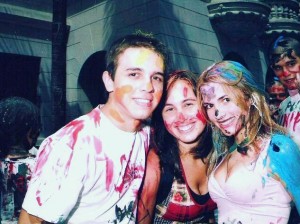A similar orientation camp tradition can also be found in Korea, says Korean student Michael Kim. There, senior students voluntarily fork out cash to buy milk for the freshmen in their group for one month. Kim explains they are willing to do so because they were treated with the same hospitality when they were freshmen.
Meanwhile, a variant of the senior-junior relationship can also be found in Brazil, only instead of a familial tie it is based on a “master-servant” relationship.
University of Sao Paulo student Douglas Trindade describes an initiation rite called “pedágio” popular in Brazil. First, freshmen paint their bodies in different colours and boys get the weirdest haircut imaginable. The new students are then taken as “slaves”, purely for amusement, by their seniors and are asked to beg for money on the roadside from the people in cars that have stopped at the traffic lights. Afterwards, they have to give all the money to their “proprietor-senior”. Half of the money goes to either charity or for a party.
“I am pretty sure this slavery joke has nothing to do with our colonial past. It’s just funny to consider someone your master for a day, you know?” says Trindade.

While university orientation programmes everywhere are mainly about having fun and making new friends, there are obvious cultural differences in achieving the same goal.
“The Norwegian students are known to have mainly, and often only, activities involving alcohol,” says Victoria Steinland from the University of Oslo. “Some say the drinking culture among Norwegian students is a little out there.”
Steinland adds that there is a festival with free events such as popular lectures, outdoor cinema and even beer brewing classes every day during what they call the “buddy weeks”, which last for two weeks.
Whereas in Germany, the “o’week” puts more focus on practicalities. “There’re orientation lectures of all kinds, even how student representation works!” says Janwillem Van De Loo who studies at the University of Hamburg.
Van De Loo thinks orientation week is something that belongs more to the Anglophone countries. “I remember Rayner, a friend from Sydney, telling me very extreme things like they get dropped off in small groups in the desert after getting hijacked really drunk from a freshers’ party,” he recalls.
In contrast, there are in general more ice-breaking games during o’camp in Hong Kong.
“In Hong Kong, it’s not as culturally easy for strangers to meet each other, so you have to provide not only more opportunities, but you have to actually do more to break the ice,” says anthropologist Joseph Bosco.
He adds that all ice-breaking games are intended to help people get to know each other more quickly. Drawing on experience from his education in the US, he thinks American students may find the games played during the orientation camp in Hong Kong very childish and not want to join in. He says: “They consider themselves adult already.”











































Interesting! And well written!